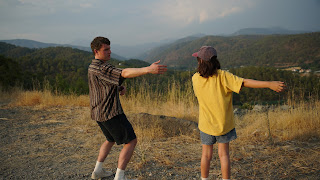Charlotte Wells' Aftersun will enjoy its Dutch premiere as part of this year's International Film Festival Rotterdam, which runs from today until 5 February. This feature debut is a strong, assured piece of filmmaking, one that owes much to the two central performances by Paul Mescal and newcomer Frankie Corio; both are terrific as a father and daughter on a Mediterranean holiday, but it is their chemistry together that provides the film with much of its emotional ballast. While Mescal's Calum and Corio's Sophie share a very close bond, a great deal of Aftersun's pathos comes from the space between these two, and the film provides a painful reminder that no matter how well someone knows another person, there is always a limit to that knowledge; as Charles Baudelaire put it in "The Eyes of the Poor": "So hard is it to understand one another, dearest, and so incommunicable is thought". Eighty years on from Baudelaire's poem, T.S. Eliot weighed in with his own perceptive take on the same subject in his play The Cocktail Party, whose mysterious Unidentified Guest stated, "What we know of other people is only our memory of the moments during which we knew them".
It is Eliot's words that carry much more bite as far as Wells' exquisitely crafted film is concerned, as the adult Sophie (Celia Rowlson-Hall) uses camcorder memories to attempt to better understand Calum, a loving, devoted father, yet one who always seemed rather distracted. It says much about Mescal's Oscar-nominated performance that he somehow manages to make Calum simultaneously absent and present, although the 11-year-old Sophie apparently fails to notice her dad's generally well-masked darker moments—which is probably exactly as he would have wanted it. As the older Sophie combs through the 1990s video recordings of a holiday the pair spent at a Turkish resort, the images serve as cues for her extensive memories of the trip; thankfully, the vast majority of Aftersun does not consist of grainy camcorder footage, but rather snippets of old film are used to both frame the story and provide us with the occasional reminder that most of what we are watching occurred a full two decades ago.
Sadly, one suspects that Sophie's scrutiny of these videotapes has reached the point where the clips may be in danger of losing their emotional significance. Her forensic study of these movies makes it seem as if she's not only using them to trigger memories but is also looking for clues, and there is a chance that anything Sophie ascribes meaning to may simply be a result of hindsight; as Susan Sontag pointed out when analysing what is arguably the greatest of all cinematic meditations on memory—Alain Resnais' Muriel—it is quite possible that these images can't be decrypted, as they don't say any more than they say. The good-natured Sophie's recollections of that summer paint a picture of a largely happy time, one when she enjoyed spending some precious moments with her dad, who by that stage had left his native Scotland—where Sophie remained with her mum—for London. Calum did appear to be on very good terms with his ex, as evidenced by a phone call he made during the holiday; indeed, it's hard to imagine Calum being at war with anyone—except, perhaps, himself.
The youthful Calum—who is frequently mistaken for Sophie's older brother—mostly comes across as a pleasant, sensitive man, and if the young Sophie failed to pick up on his more introspective moments, it may have been because she had her own distraction in the form of a boy she'd befriended in the resort's amusement arcade; even without this development, there is no reason why Sophie should have spotted the flickers of self-doubt that occasionally broke through Calum's cheerful exterior. It is quite telling that Sophie revisits both the memories and video footage when she reaches the same age her father was during the holiday; does she think that in getting to this point—at which Sophie is also a parent—she will have a better chance of seeing the world as he saw it? Aftersun instils a rising anxiety in the viewer—not quite Uncut Gems-level stuff, but it nevertheless carries a persistent sense of foreboding. Not that this should be the main takeaway from Charlotte Wells' hauntingly ambiguous film, which expertly depicts the aching gap that lies between children and their parents.
Darren Arnold
Images: BFI / Sarah Makharine






